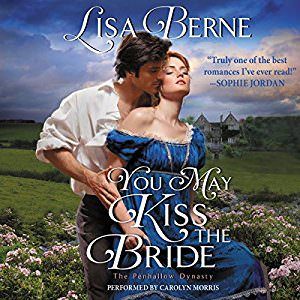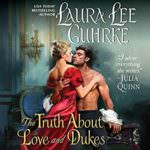 Narrated by Carolyn Morris
Narrated by Carolyn Morris
I admit that I picked up You May Kiss the Bride for review solely because of Carolyn Morris. Reviews for this début historical romance, the first in Lisa Berne’s Penhallow Dynasty series have been mixed, but I knew I’d at the very least enjoy the narration, so I decided it give it a go. In the end, my opinions about the story are pretty much along the same lines as the less than glowing reviews; it’s nothing I haven’t read before and the author’s inexperience shows clearly in terms of the storytelling and characterisation.
Livia Stuart hasn’t had an easy life. Orphaned in India when she was a child, she was sent back to England and resides with her listless aunt and drunken uncle, who never really wanted her and who wouldn’t miss her if she disappeared. She is constantly patronised by her neighbour and local mean girl, the Honourable Cecily Orr, who pretends friendship but in reality does everything she can to make “dear Livia” aware of her inferior situation, insisting on giving her her cast off gowns and never missing an opportunity to point out Livia’s status as a poor relation.
Gabriel Penhallow, by contrast, has it all – money, social standing, dark good looks – and as a member of one of the oldest families in the country, is well aware of his consequence. He knows it’s time for him to do his duty, get married and start filling his nursery, and even though he’s not wild about the idea of taking a bride chosen for him by his formidable grandmother, he goes along with it, because ultimately, he’s marrying in order to secure the succession, so as long as she’s suitable – well-bred, demure, able to fulfil her position in society as his wife – that’s all that matters.
He agrees to travel to Wiltshire to meet the lady his grandmother has selected, Cecily Orr, the daughter of Viscount Glanville. She’s beautiful, accomplished… and as empty-headed as every other society debutante Gabriel has ever met. But she’s most definitely suitable, and, as he keeps reminding himself, he’s getting married in order to beget an heir and intends to keep to “The Penhallow Way” wherein husbands and wives live separate lives without emotional entanglements.
Out riding one afternoon, Gabriel realises he’s lost his way and stops to ask directions of a young woman he guesses is a servant or estate worker. Resenting his high-handed manner, Livia plays up to his expectations and gives him directions that will mean his journey back to the Glanville’s will take him at least twice as long as it should. Having already worked out that this haughty gentleman must be none other than the visiting Gabriel Penhallow, Livia decides on the spot that she despises him – even though his assumption that she’s a servant seemed perfectly plausible to me, given she is shabbily dressed and unaccompanied. I suppose the author had to find some reason to set up the animosity between them, but I wish it hadn’t been such a flimsy one.
Next night at the Glanville ball, Gabriel is astonished to see the servant girl from the day before and angrily realises he’s been played for a fool. But his anger can’t quell the realisation that Livia Stuart is a beauty or quash the sudden heated attraction that flares between them and leads to a passionate kiss in the darkness of the terrace. Unfortunately, however, the kiss does not go unobserved and Gabriel immediately does the right thing and proposes. Upset and annoyed, Livia makes clear her displeasure, vows she won’t marry him and runs away. Gabriel finds her and furiously insists that she will marry him, but that theirs will be a marriage in name only. Wait – what? We’re told the only reason Gabriel is getting married is to father an heir, but now he’s prepared to marry a woman he (supposedly) doesn’t want and not sleep with her? *facepalm*
Livia then decides that she’ll marry him but that she’ll make him miserable by turning herself into the sort of woman he thinks he wants – someone insipid and spiteful like Cecily Orr. So she puts her best foot forward and travels to Bath with Gabriel’s formidable grandmother in order to embark on her education as a bride fit for a Penhallow. During this time, she somehow realises that Gabriel is a wonderful man and falls in love with him, although quite honestly, I don’t know how or why she came to that realisation; and I don’t know why, when or how he fell in love with her, either.
You May Kiss the Bride is a very run-of-the-mill historical romance that doesn’t transcend its tropes and quickly becomes a very stodgy listen. Gabriel and Livia are bland and unmemorable, there is practically zero chemistry between them and they spend too much time apart for the romance to be properly developed (Livia spends more time with Gabriel’s grandmother than with him). The ubiquitous “we’re-caught-in-a-storm-oh-look-there’s-a-hut-in-the-forest” sex scene is thrown in, seemingly at random, in spite of Gabriel’s “no sex” rule. The story is episodic rather than progressive – Gabriel and Livia move from one plot point to another without there being any link between them or any sense of a developing storyline. There’s a lot of telling and not much showing throughout, and the entirety of the final section, in which Gabriel wakes up to the fact that he has neglected his estates, makes no sense whatsoever, given that a landowner of his status would have had an army of stewards and men of business to run them during his absence. It’s just another device used in order to try to push some eleventh-hour conflict into a dull story and I think any long-time reader/listener of historical romance would, quite frankly, be justified in feeling insulted at the author’s trying to offload such a lot of old flannel.
I said at the outset that I picked up this audiobook on the strength of Carolyn Morris, and at least there, I wasn’t disappointed. It’s largely due to her convincing and engaging performance that I was able to get to the end of this audiobook without screaming in frustration or dying of boredom – and I take my hat off to her for managing to keep me invested in the listen for as long as it took me to realise the story was going nowhere. The narrative is well-paced and Ms. Morris’ character differentiation is excellent, particularly when it comes to voicing the secondary characters such as the odious Cecily – whose unpleasantness is masked beneath a slightly simpering tone – and Miss Cott, Mrs. Penhallow’s softly spoken, long-suffering companion. The grande dame herself sounds perfectly austere and proper, although there are hints of vulnerability beneath, and I particularly liked the portrayal of Gabriel’s cousin Hugo, who pops up in the last part of the story. He’s a congenial, good-hearted young man and sounds it – plus there’s no confusing him with Gabriel, whose speech is considered, with just the slightest hint of an aristocratic drawl. As is always the case, Ms. Morris imbues the heroes she narrates with just the right amount of hauteur and attractiveness – and has, I suspect, made Gabriel somewhat more appealing than he was on the page.
I’ve been fortunate over the past year to read and listen to a number of books by first-time authors whose work is so accomplished, you’d never have known they were débuts. You May Kiss the Bride isn’t one of them, however. The book is poorly conceived and executed and it’ll be a while before I try another by this author.
Caz
Buy You May Kiss the Bride by Lisa Berne on Amazon



